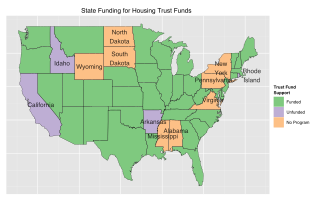Related Research Articles

The Federal Housing Administration (FHA), also known as the Office of Housing within the Department of Housing and Urban Development (HUD), is a United States government agency founded by President Franklin Delano Roosevelt, established in part by the National Housing Act of 1934. Its primary function is to provide insurance for mortgages originated by private lenders for various types of properties, including single-family homes, multifamily rental properties, hospitals, and residential care facilities. FHA mortgage insurance serves to safeguard these private lenders from financial losses. In the event that a property owner defaults on their mortgage, FHA steps in to compensate the lender for the outstanding principal balance.

The United States Department of Housing and Urban Development (HUD) is one of the executive departments of the U.S. federal government. It administers federal housing and urban development laws. It is headed by the secretary of housing and urban development, who reports directly to the president of the United States and is a member of the president's Cabinet.

A housing cooperative, or housing co-op, is a legal entity, usually a cooperative or a corporation, which owns real estate, consisting of one or more residential buildings; it is one type of housing tenure. Typically housing cooperatives are owned by shareholders but in some cases they can be owned by a non-profit organization. They are a distinctive form of home ownership that have many characteristics that differ from other residential arrangements such as single family home ownership, condominiums and renting.

An FHA insured loan is a US Federal Housing Administration mortgage insurance backed mortgage loan that is provided by an FHA-approved lender. FHA mortgage insurance protects lenders against losses. They have historically allowed lower-income Americans to borrow money to purchase a home that they would not otherwise be able to afford. Because this type of loan is more geared towards new house owners than real estate investors, FHA loans are different from conventional loans in the sense that the house must be owner-occupant for at least a year. Since loans with lower down-payments usually involve more risk to the lender, the home-buyer must pay a two-part mortgage insurance that involves a one-time bulk payment and a monthly payment to compensate for the increased risk. Frequently, individuals "refinance" or replace their FHA loan to remove their monthly mortgage insurance premium. Removing mortgage insurance premium by paying down the loan has become more difficult with FHA loans as of 2013.
The Minnesota Housing Finance Agency (MHFA), or Minnesota Housing, is a state agency in Minnesota, United States, established to address the growing concerns of affordable housing, homelessness, and housing security in the state. Its primary mission is to provide affordable housing opportunities for Minnesotans who are low and moderate income earners. Created by the Minnesota Legislature, the agency works to stimulate the construction, rehabilitation, and sustainability of affordable homes and rental properties.

Canada Mortgage and Housing Corporation is Canada's federal crown corporation responsible for administering the National Housing Act, with the mandate to improve housing by living conditions in the country.
The Rural Housing Service (RHS) is an agency of the United States Department of Agriculture (USDA). Located within the Department's Rural Development mission area. RHS operates a broad range of programs to provide moderate- low- and very-low-income Americans in rural communities with:
The New York State Housing Finance Agency (HFA) is a New York State public-benefit corporation created in 1960 to increase the supply of rental housing for low-income people by issuing bonds and providing low-interest mortgage loans to regulated housing companies.

The Texas Department of Housing and Community Affairs (TDHCA) is the state's lead agency responsible for homeownership, affordable rental housing, community and energy assistance programs, and colonia activities serving primarily low income Texans. The Manufactured Housing Division of TDHCA regulates the manufactured housing industry in Texas. The Department annually administers more than $400 million through for-profit, nonprofit, and local government partnerships to deliver local housing and community-based opportunities and assistance to Texans in need. The department is headquartered at 221 East 11th Street in Austin.

The California Housing Finance Agency (CalHFA), established in 1975, is an independent California state agency within the California Department of Housing and Community Development that makes low-rate housing loans through the sale of taxable and tax exempt bonds.
Public housing policies in Canada includes rent controls, as well as subsidized interest rates and grants. Early public housing policy in Canada consisted of public-private lending schemes which focused on expanding home ownership among the middle class. The first major housing initiative in Canada was the Dominion Housing Act of 1935, which increased the amount of credit available for mortgage loans.
The Pennsylvania Housing Finance Agency is a non-profit organization which serves the people of Pennsylvania by offering affordable housing resources, including loans and rent assistance. PHFA was created by an Executive Order by the Pennsylvania General Assembly in 1972.
Kentucky Housing Corporation (KHC), the Kentucky state housing agency, was created by the 1972 Kentucky General Assembly to provide affordable housing opportunities. KHC is a self-supporting, public corporation.

Housing trust funds are established sources of funding for affordable housing construction and other related purposes created by governments in the United States (U.S.). Housing Trust Funds (HTF) began as a way of funding affordable housing in the late 1970s. Since then, elected government officials from all levels of government in the U.S. have established housing trust funds to support the construction, acquisition, and preservation of affordable housing and related services to meet the housing needs of low-income households. Ideally, HTFs are funded through dedicated revenues like real estate transfer taxes or document recording fees to ensure a steady stream of funding rather than being dependent on regular budget processes. As of 2016, 400 state, local and county trust funds existed across the U.S.
Non-profit housing developers build affordable housing for individuals under-served by the private market. The non-profit housing sector is composed of community development corporations (CDC) and national and regional non-profit housing organizations whose mission is to provide for the needy, the elderly, working households, and others that the private housing market does not adequately serve. Of the total 4.6 million units in the social housing sector, non-profit developers have produced approximately 1.547 million units, or roughly one-third of the total stock. Since non-profit developers seldom have the financial resources or access to capital that for-profit entities do, they often use multiple layers of financing, usually from a variety of sources for both development and operation of these affordable housing units.

Affordable housing in Canada refers to living spaces that are deemed financially accessible to households with a median household income. Housing affordability is generally measured based on a shelter-cost-to-income ratio (STIR) of 30% by the Canada Mortgage and Housing Corporation (CMHC), the national housing agency of Canada. It encompasses a continuum ranging from market-based options like affordable rental housing and affordable home ownership, to non-market alternatives such as government-subsidized housing. Canada ranks among the lowest of the most developed countries for housing affordability.

Howard County Housing is the umbrella organization for the Howard County Department of Housing and Community Development and the Howard County Housing Commission. The Department is Howard County Government’s housing agency, and the Commission is a public housing authority and non-profit. Both have boards that meet monthly.
The Texas State Affordable Housing Corporation (TSAHC) is a nonprofit affordable housing provider in Texas.
The Utah Housing Corporation or UHC is a public corporation that the Utah legislature created in 1975 to advocate for affordable housing for lower-income residents in the state of Utah. UHC is an independent government agency that raises funds in order to offer mortgage loans to lower-income people and to provide resources to developers and builders for creating affordable housing projects. It does not receive any funds from the State of Utah and is completely self-supporting via the issuing of tax-exempt bonds and the creation of and selling of mortgage-backed securities to investors.

Affordable housing is housing that is deemed affordable to those with a median household income as rated by the national government or a local government by a recognized housing affordability index. A general rule is no more than 30% of gross monthly income should be spent on housing, to be considered affordable as the challenges of promoting affordable housing varies by location.
References
- 1 2 3 "Illinois Housing Development Authority". ihda.org. State of Illinois. 2021. Retrieved January 5, 2022.
- ↑ "Paying for Senior Care". ihda.org. State of Illinois. 2022. Retrieved January 5, 2022.
- ↑ Olsen, Dean (February 3, 2022). "Apartment complex to get overhaul". Illinois Times . Springfield, Illinois . Retrieved February 6, 2022.
- ↑ Nowicki, Jerry (December 9, 2021). "New round of rental assistance opens". Illinois Times . Springfield, Illinois . Retrieved January 5, 2022.